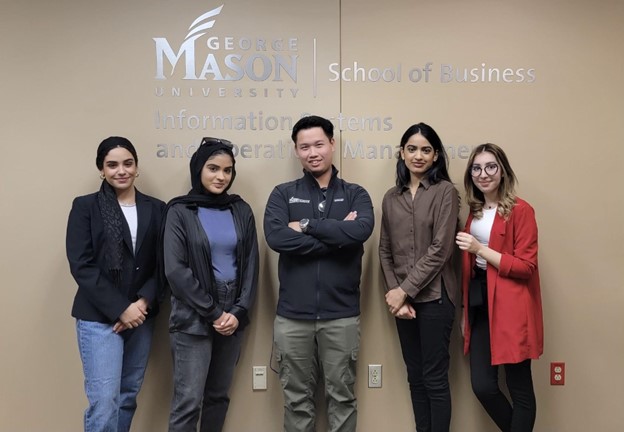This page has moved to the Defense Innovation Unit
You are being redirected to DIU.mil
This page has moved to the Defense Innovation Unit
You are being redirected to DIU.mil
We use cookies for analytics, to see our policy, please read our Privacy Policy.

This spring four students from George Mason worked for the DoD’s Vulnerability Disclosure Program (VDP). The students – Sarah Omara, Varsha Ahmed, Shareen Shaik, and Nisrine Bencherki – will map VDP’s employee onboarding process. They will create a visual representation of the process, identify areas for improvement, and submit possible solutions to VDP Director Melissa Vice.
“This is real work,” said Brian Ngac, Dean’s Teaching Fellow for George Mason’s Information Systems & Operations Management Academic Unit. “This is about understanding a challenge and applying technology to eliminate pain points.”
Ngac explains that this was not an internship or an opportunity for class credit; the students were paid for their work. Every student must apply for the position, which includes submitting a resume and a list of technical skills and getting a professor’s recommendation.
Ngac approached his department’s leadership to expand the program in the future. He recently closed a funding opportunity with the Commonwealth Cyber Initiative to provide payment for those in the program.
Vice worked with the National Security Innovation Network (NSIN) to create this opportunity. Once the students complete the onboarding program, they will tackle other initiatives such as analyzing lessons learned from a VDP pilot program from 2021 that looked to find innovative solutions for the size and needs of the Defense Industrial Base.
“I would previously take students who did this type of work out to lunch at the end of the semester,” Ngac said. “The ability to pay them for their work and for them to understand this is real work with a real client is immeasurable.”
Vice has already seen the positive impact the students bring.
“I could not be happier with the work the GMU Team has put into applying innovative critical thinking to the DIB-VDP Pilot scalability problem statement,” she said.
“The Capstone project is a win-win for federal agencies and university students alike,” she added. “Students gain valuable insight by working with professional organizations on real-world problem sets, and organizations like VDP are able to leverage motivated minds primed by the academic environment to take on the rigorous research necessary to answer challenging questions.”
Introducing outsiders’ perspectives on organizational processes—such as DC3’s onboarding procedures—often leads to creative ideas that challenge established norms. In this case, GMU students considered DC3 VDP’s labor intensive challenges, reviewed current processes, and looked for ways automation via artificial intelligence could reduce the resources required while facilitating smoother client acquisition and communication. The resulting recommendations included creating an onboarding cloud-based portal where Defense Industrial Base companies (DIBCOs) are guided with chat-bot assistance while onboarding the Defense Industrial Base Vulnerability Disclosure Program.
At the end of eight weeks, recommended changes boosted scalability from 50 DIBCOs up to 1,000, while decreasing labor hours by 50-89%, and lowering processing time-per-DIBCO onboarded from eight hours to only one–all while maintaining the same budget.
The well-researched recommended solutions included cybersecurity triad methodology and FedRAMP-approved products. Programs such as Capstone demonstrate the value academia can offer federal organizations, even when limited to the unclassified environment.
This article also appeared on the U.S. Department of Defense news site. Find it here.
About National Security Innovation Network
NSIN is a government program office within the Office of the Secretary of Defense for Research and Engineering (OSD(R&E)) that collaborates with major universities and the venture community to develop solutions that drive national security innovation. We operate two portfolios of programs and services: Talent and Venture. Together, these portfolios form a pipeline of activities and solutions that accelerate the pace of defense innovation.
For more information or media interview requests with Team NSIN, please contact us at media@nsin.mil.
Your browser is old and unsupported. You may still use the site, but functionality will be limited and you may see errors. Please consider updating your browser.